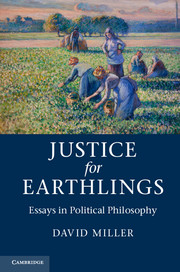Book contents
- Frontmatter
- Contents
- Acknowledgements
- Introduction
- 1 Political philosophy for Earthlings
- 2 Two ways to think about justice
- 3 Social justice in multicultural societies
- 4 Liberalism, equal opportunities and cultural commitments
- 5 Equality of opportunity and the family
- 6 Justice and boundaries
- 7 Social justice versus global justice?
- 8 ‘Are they my poor?’: the problem of altruism in a world of strangers
- 9 Taking up the slack? Responsibility and justice in situations of partial compliance
- 10 A tale of two cities; or, political philosophy as lamentation
- Index
- References
3 - Social justice in multicultural societies
Published online by Cambridge University Press: 05 February 2013
- Frontmatter
- Contents
- Acknowledgements
- Introduction
- 1 Political philosophy for Earthlings
- 2 Two ways to think about justice
- 3 Social justice in multicultural societies
- 4 Liberalism, equal opportunities and cultural commitments
- 5 Equality of opportunity and the family
- 6 Justice and boundaries
- 7 Social justice versus global justice?
- 8 ‘Are they my poor?’: the problem of altruism in a world of strangers
- 9 Taking up the slack? Responsibility and justice in situations of partial compliance
- 10 A tale of two cities; or, political philosophy as lamentation
- Index
- References
Summary
This chapter will examine obstacles to the pursuit of social justice posed by the multicultural character of virtually all contemporary liberal democracies. A society is multicultural, for present purposes, when its citizens belong to a number of distinct ethnic and/or religious groups, and membership of these groups is regarded as an important source of personal identity. Multiculturalism, in other words, requires more than just the coexistence in a single society of various religions, musical cultures, ethnic cuisines and so forth. It requires that people see themselves as belonging to groups defined by one or more of these cultural markers, as having a special relationship with other members of that group and as regarding their group identity as significant and valuable. In other words, we can legitimately speak of multicultural societies as made up of distinct cultural communities, while of course recognizing that the boundaries that exist between these communities are not always sharp – some people, by virtue of intermarriage, for instance, will see themselves as straddling two or more cultural groups.
The issue I want to address is the implications this has for the pursuit of social justice. One aspect of the question has already been dealt with quite extensively in the literature: What special claims, if any, can cultural groups make in the name of justice, especially groups that have hitherto fared relatively badly in the distribution of social resources? There have been wide-ranging debates about the justifiability of special rights for disadvantaged groups, and about the legitimacy of affirmative action programmes, for instance. However, my aim here is to tackle a different question, namely does the very idea of social justice still make sense when societies become multicultural in the sense just outlined? This might seem an odd question to ask. It makes some sense, however, if we make the following assumption about social justice: that for a society to be socially just, it is not sufficient that its basic social and political institutions should distribute resources according to valid principles of justice, but it is also necessary that these principles themselves should be a matter of reasonable agreement among the members. In other words, a just society is one whose members live together on terms of justice – they live according to principles that each has good reason to accept.
- Type
- Chapter
- Information
- Justice for EarthlingsEssays in Political Philosophy, pp. 70 - 92Publisher: Cambridge University PressPrint publication year: 2013
References
- 1
- Cited by



